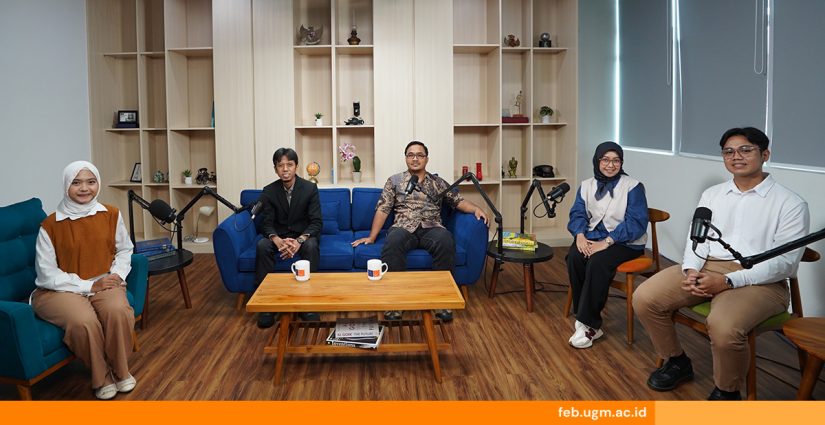
In addition to its undergraduate programs, the Faculty of Economics and Business, Universitas Gadjah Mada (FEB UGM), also offers excellent postgraduate programs. Among them are the Master of Business Administration (MBA) and the Master of Development Economics (MEP) programs, part of the six master’s programs offered by FEB UGM.
What are the advantages of these two programs? These were thoroughly discussed in the FEB Overview session “Develop Business Leadership and Careers in Economics with MBA and MEP Programs,” broadcast live through FEB UGM’s official social media channels on Tuesday (27/05). The session explored the unique benefits, specializations, and learning experiences each program offers.
Master of Business Administration
Rocky Adiguna, S.E., M.Sc., Ph.D., Secretary of the MM Program at FEB UGM, explained that the Master of Management is a practice-oriented program, making it distinct from the Master of Science program, which focuses more on research. MM FEB UGM offers seven concentrations: Marketing, Operations, Human Resources, Finance, Strategic Management, Entrepreneurship, and the newest one, Sustainability Management. Notably, the Sustainability Management concentration at MM FEB UGM is one of the first in ASEAN. Even before launching this concentration, MM FEB UGM had already collaborated with the Norwegian government to provide a fully funded scholarship through the ASEAN Master in Sustainability Management program.
MM FEB UGM operates at two campus locations, its main campus in Yogyakarta and a second campus in Jakarta. It offers three program tracks, MBA, International MBA, and Executive MBA, which is specifically designed for professionals with prior work experience. These programs are supported by flexible teaching schedules, particularly for the Executive MBA, which is held on weekends, Saturdays in Yogyakarta and Fridays-Saturdays in Jakarta.
Graduates of MM FEB UGM enjoy a wide range of career opportunities, from business practitioners and academics to entrepreneurs. The program is open to applicants from various academic backgrounds, not limited to economics or business. For students from non-business backgrounds, a one-semester matriculation class is provided as preparation before starting the core curriculum. Regarding intake capacity, Rocky mentioned that the Yogyakarta campus admits around 120 students per cohort, while the Jakarta campus admits approximately 160 students across all MBA, IMBA, and Executive tracks.
Rocky also offered advice for prospective applicants to prepare thoroughly, especially for document screening and interviews. He encouraged applicants to present their experiences or personal stories that reflect strong values and a clear vision for why they chose MM FEB UGM, as well as the added value they hope to gain from the program.
Master of Development Economics
Akhmad Akbar Susamto, S.E., M.Phil., Ph.D., Head of the MEP Program at FEB UGM, explained that the Master of Development Economics is an applied economics program with a strong focus on development issues. Unlike the Master of Science in Economics, MEP graduates earn the degree of M.Ec.Dev. (Master in Economic Development). MEP FEB UGM offers five concentrations: Sustainable Economic Development, Regional Planning and Development, Regional Asset and Financial Management, Property Valuation and Asset Management, and Business Valuation and Asset Management. Additionally, MEP now offers a new concentration in Digital Innovation and Economic Development through a dual degree program in collaboration with several renowned universities in Japan.
To equip its graduates with the ability to analyze complex development policy issues, MEP FEB UGM provides students with strong foundations in microeconomics and macroeconomics, data analysis skills using software such as Stata, R Studio, and EViews, and practical experience through internship programs. Regarding career prospects, Akbar noted that MEP graduates have diverse career paths, not limited to civil service (ASN) or state-owned enterprises (BUMN), but also including the private sector, entrepreneurship, and public valuation professions. Uniquely, MEP FEB UGM is the only university in Indonesia that provides certified valuation education in collaboration with the Indonesian Society of Appraisers (MAPPI).
Applicants from non-economics backgrounds are also welcome, provided they meet the requirements and complete a matriculation program. This year, MEP FEB UGM expects to admit around 40–50 students per cohort, with four admission cycles annually. Students can choose between regular, international, or executive (weekend) classes. However, admissions for the executive class are only open once a year. MEP also offers special classes for institutions that send employees in groups. Detailed information about the admission requirements about MBA and MEP program can be found at um.ugm.ac.id.
Student Stories: Studying at MM and MEP FEB UGM
Muhammad Hanif Ramadhan, a student from MM FEB UGM batch 84, and Aleina Namira Zalzabila, S.E., a student from MEP FEB UGM batch 72, shared their personal experiences. Hanif, who has an undergraduate background in Psychology, chose MM FEB UGM to better manage his family business. On the other hand, Aleina was drawn to the MEP program for its balance between theoretical learning and practical fieldwork such as internships.
Both students acknowledged that the academic pressure at the beginning of the program was a significant challenge. However, they also reaped many benefits, including expanding their networks, organizational experiences, and broader perspectives. Hanif, who served as CEO of the MBA Student Association, shared that studying at MM FEB UGM gave him numerous opportunities to network with MBA students both from Indonesia and abroad. To help students unwind from academic demands, MM FEB UGM also offers a variety of academic and non-academic clubs.
Aleina echoed similar sentiments. During her time in MEP FEB UGM, she successfully built connections with master’s students from universities around the world. She believes that academic pressure has helped her develop better time management and stress management skills.
Aleina is a recipient of the Leaders in Economic Development Scholarships (LEDs), a full scholarship awarded by MEP FEB UGM for students with strong academic and non-academic achievements. Meanwhile, MM FEB UGM offers tuition waiver scholarships. Both programs also accept external scholarships such as LPDP and funding from other institutions.
Report by: Najwah Ariella Puteri
Editor: Kurnia Ekaptiningrum
Watch the full video: https://youtube.com/live/39yp3b4zhSw
Sustainable Development Goals









